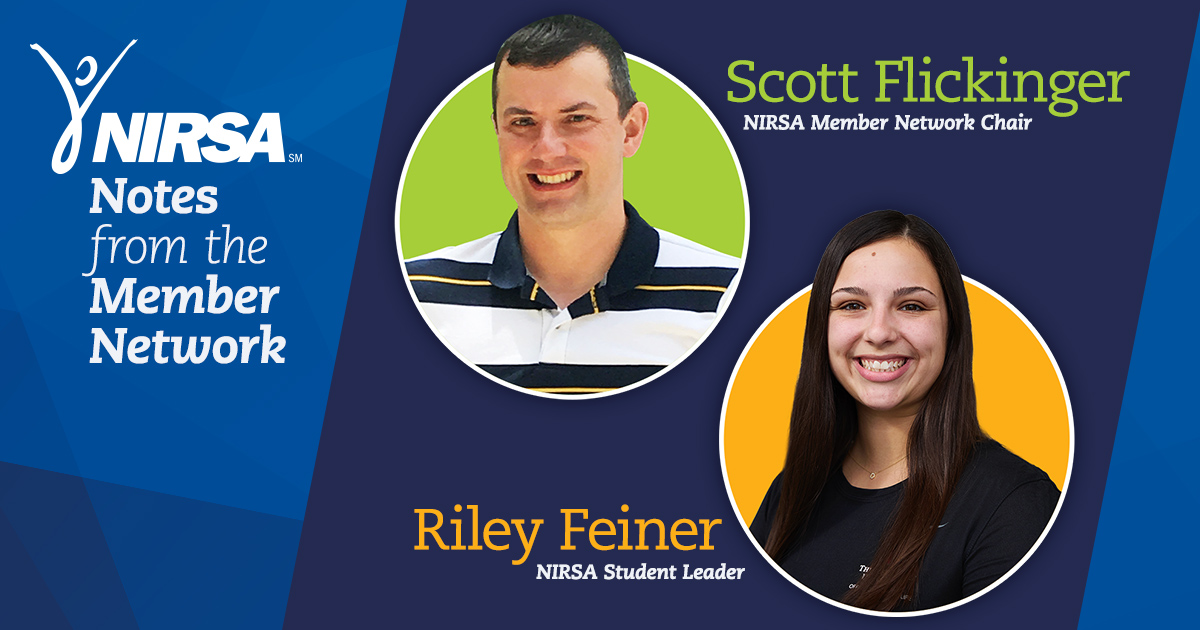By Erica Estes, Graduate Assistant for Facilities & Fitness at the University of Southern Mississippi
As a second-year graduate assistant, I finally have a clear understanding of the hard skills that my job entails. Now that I’m more comfortable in my role, I’ve been able to explore the intangible aspects of the position—student development, leadership, and engagement—and I’ve discovered that this is where my passion lies within campus recreation.
Through introspection and situational awareness, I’ve come to understand the unique and delicate position that graduate assistants and student managers are often placed in as leaders. Graduate assistants often serve as an intermediary between the professional coordinators and the students who serve as the face of the facility. Through my interactions with GAs and students Association-wide, I’ve found that each institution has a different culture when it comes to departmental leadership. With this in mind, I believe it’s imperative that we each—at least initially—tread lightly in our leadership endeavors.
We must first take the time to determine what our unique mission is in relation to leadership initiatives. We must discern how our personal style can be implemented within the culture of our current facility or setting. We must also understand the personal strengths, goals, and motives our supervisors and students possess.
To acquire a greater understanding of leadership in action, I’ve been reading Michael Youssef’s book The Leadership Style of Jesus with my NIRSA mentor Stefanie Rodgers, Fitness Program Director at Georgia Southern University. My personal style has always been as a “servant leader.” Youssef articulates and illustrates this leadership style as people who have “the heart of a servant and the wisdom of a leader.”
Service is the lifeblood of an organization and so I strive to serve those that surround me—whether they’re professionals, patrons, or students. Mallory Gohl—former NIRSA Student Leader and Sports Facilities Operations Manager at the University of Wisconsin-Eau Claire—and Greg Jordan—Director of Campus Recreation at Oakland University—offered similar advice at the 2013 J. Michael Dunn Preconference Workshop in their “Finding your Passion” presentation. In that presentation, they stated that there is no better personal investment than giving your best to your employer and your employees.
There are a significant number of actions we can undertake to serve these special people in our lives. For example, we can pay our passion forward by submitting scholarships on our students’ behalves. These scholarships can help make travel, registration, and attendance at the upcoming 2016 NIRSA Annual Conference & Recreational Sports Expo—which is taking place in Kissimmee, Florida from April 3–6—possible. Student scholarships are a wonderful platform with which to serve and lead others within collegiate recreation.
Youssef also expounds on the impact that preceding leaders have had on us. In The Leadership Style of Jesus, he states that “the willingness to acknowledge those who went before is a characteristic of good leadership.” We have all been developed, uplifted, and motivated by individuals in this field. And so we should take the time to serve the leaders that have come before us by nominating them for the Horace Moody Award. Be a servant leader by giving back to those who have made your academic and professional endeavors so rewarding.
Mentor relationships are a fantastic illustration of servant leadership and I am grateful for the mentors in my life who have pushed me to explore beyond my comfort zone. Youssef details the importance of authentic mentor relationships when he provides the following statistics:
- Fully 75% of executives list mentoring as a key factor in their career success
- The productivity of managing executives increased 88% when mentoring was involved
- 71% of Fortune 500 companies—the most successful companies in the world—use mentoring as a training tool
- 77% of businesses say that mentoring programs increase employee retention
He concludes by stating that “these leaders and companies don’t just think about profit; they are concerned about people.” It’s imperative that we remember leadership is relational. Get to know the individual personalities surrounding you. Reach out to others in the Association through the NIRSA Mentor Program and make a difference in the life of someone outside of your campus. I have been so blessed to see this program grow exponentially over the last several months as NIRSA members have embraced mentorship. With over 160 professionals and students engaged, our Association is surely making an impact through servant leadership.
Youssef motivates us “not merely to collect a group of followers but to raise up a new generation of leaders.” I believe that I can speak for the entire 2015–2016 Student Leadership team when I say that Vicki Highstreet—Associate Director for Recreation Programming at the University of Nebraska-Lincoln and Past President’s Representative—who is more commonly known to us as Mama Vic, has made this mission clear to us since taking office in May. She shared the parable that has shaped her life—“The Starfish Story”—with us and I now see the importance of each individual I encounter in my walk through leadership. I strongly encourage every one of you to live out leadership in your daily life, to strive to impact the starfish in your life.





